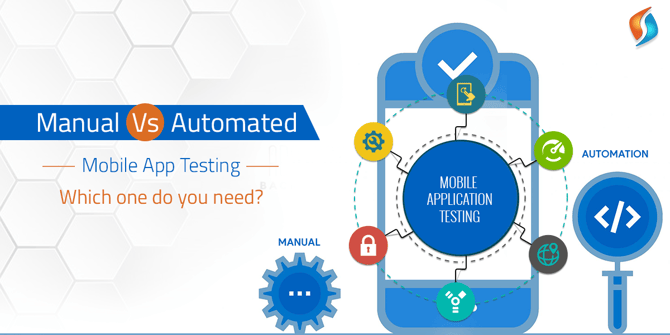Manual vs Automated Mobile App Testing: Which One Do You Need?

“Necessity is the mother of all inventions.”
We all have come across this phrase since our junior high school. We have seen technology taking new form every day. In the present world, technology once invented becomes outdated in quick time. Similar is the case of our mobile phones or better called "smartphones". Today is an era of thinner bezels and many camera setups marrying blazing speed processors to give that Thor-like feeling right on one's palm. As you are reading this article, a new break-through app or an update is developing in some corner of the World. And in most cases, these apps must be undergoing beta testing. Today, app developing is one of the most sought passion-turned-career. No wonder today, there are many top mobile application development companies in India.
Quality will outrun quantity at any hour of the day
Quality testing comes before the launching of the application, during the final stages of development. This is the determination stage in the life cycle of any product. It determines whether the app will see the sunshine or end up in the recycle bin of the developer. There are two kinds of tests that any app development company invests in:
- Manual testing
- Automated testing
Manual Mobile App Testing
Anything involving human touch is bound to be better than the mechanical counterpart. The mechanical output might have smooth finishing. But the care taken during the manual process is beyond explanation. Similar is the case of manual testing by a mobile app development agency. For delivering quality apps, the testing must be manually at any stage. It helps to identify minute glitches which might go unnoticed by software.
There is always a need to determine the best-suited test for any software. One must realize that every test has an advantage and shortcoming. Take an example of a simple app failure or app initialization. In such cases software redirects to write a detailed description of the incident. As well as what could have been done to prevent that. This helps manual testers who are offering mobile development solutions. They can concentrate on the specific point of fault and rectify it. An automated test might have failed to do that. It has the option for troubleshooting only. That only checks for hardware issues and calibrations. For in-depth analysis, performing manual testing is ideal.
Advantages of Manual Testing-
- Checking of the user interface. This includes the areas which remain untouched by automation. Identifying these areas unlocks further scope of improvements.
- Only manual testing can ensure the app usage like a user. It helps to gather more knowledge about the app abnormality before user complaints. Moreover, it becomes easier to determine the reason behind many app-crashes. With repeated analysis. It offers the real-life experience of worst-use. With this, it is possible to measure the limitations of the application and rectify them.
- If the app has a low-budget and offers low revenues, which is frequently found in the android app development, then manual testing is the ideal choice. It saves time, effort and money that is used elsewhere.
Shortcomings of Manual Testing-
- “To err is to human…” and humans are not immune to mistakes. Hence, exhaustion, fatigue, depression might cause the developer to cause inaccuracy.
- Manual testing requires some skilled and specialized people to perform. There is no guarantee of consistency in the case of humans as there might be certain circumstances. Hence at times, there might be no one to perform manual testing.
- Test procedures are long and tiresome, hence are better avoided. In the case of an order from seniors, the work might be performed with a lack of interest. Thereby the results will not up to the mark and might have errors.
There is a scope of manual testing in an area where the app is under development as such determination tasks need special skills and experience. Recently, monkey testing has gained a lot of popularity for its immaculate results. It helps in improving the performance of the app. Humans better perform such testing. Humans can check for circumstances, programming of which is not possible in software.
Automated Mobile App Testing
The world is moving at the speed of mars rover and moon landers. Development of state-of-the-art technologies is going on at high speeds. So, it is high time to upgrade the testing process to machines. Moreover, it is possible to repeat automated tests 'n' number of times, without any fatigue. Programming of machine ensures precision on its part. So far, mobile app development companies have not been able to come up with a sustainable and cheap solution for Android and iPhone app development in USA. If the app is just an entry-level app with least revenue promise, then automated testing solutions might prove a costly affair. There are some advantages involving this testing.
Advantages of Automated testing-
- With due course of time, heavier apps need regular updates and troubleshoots. It is not possible with manual testing. It would be not possible to keep a check all the time. Hence this testing will prove cheaper.
- It can run many tests on the same or different applications together, saving a lot of time and effort.
Now, let’s look at various limitations of this testing.
Shortcomings of Automated testing-
- It can't imitate human intelligence. Hence, many aspects are ignored, where the possibility of errors can be more significant.
- Different apps have different codes and specifications. Hence, automated testing requires proper adaptation for each application which will prove tedious.
For quality control, all mobility service providers should use testing as per the app's need, revenue and codes. But in any case, manual testing is an integral part of the testing module, then we should not ignore it if the company desires to provide an unmatched user experience. However, for mass processing, automated testing is suitable for mobile app development.
Conclusion
Are you looking for a mobile app development agency in India? Then your search ends with Signity Solutions. Our team members have significant experience in both manual and automated testing. So we can help you ensure that your app is error-free and offers you the results you desire. Contact us now to outsource app development to India.



.png?width=344&height=101&name=Mask%20group%20(5).png)















